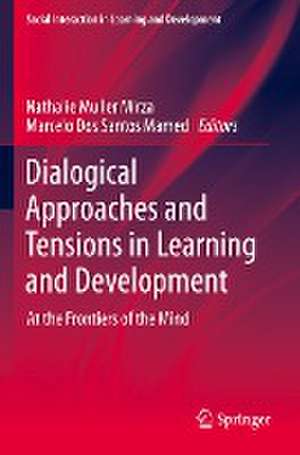Dialogical Approaches and Tensions in Learning and Development: At the Frontiers of the Mind: Social Interaction in Learning and Development
Editat de Nathalie Muller Mirza, Marcelo Dos Santos Mameden Limba Engleză Paperback – 28 oct 2022
The book pursues the goal of exploring and strengthening a dialogical approach of communication and cognition. It brings together contributions from world-leading researchers related to the dialogical approach in education and psychology. It presents, among others, the place of language and materiality in the development of communication and thinking, as well as the role of the methods in the relationship between researchers and participants. This leads to an innovative definition of the dialogicality and how a dialogical approach can provide heuristic (conceptual and methodological) tools to better understand how people think, communicate and learn in a complex world.
The authors hereby develop an epistemological framework inspired by scholars such as Michaïl Bakhtin, Lev Vygotsky and Herbert Mead under the assumption that dialogue, or dialogicality - and therefore the presence of the other – is fundamentally entangled into the human thinking and development.
This book contributes to the understanding of human communication, cognition and mind, and participates in a scientific dialogue which helps to advance future research. It includes theoretical and empirical chapters and presents innovative methods of inquiry, which makes it a useful tool for both teaching and research.
| Toate formatele și edițiile | Preț | Express |
|---|---|---|
| Paperback (1) | 774.21 lei 6-8 săpt. | |
| Springer International Publishing – 28 oct 2022 | 774.21 lei 6-8 săpt. | |
| Hardback (1) | 780.06 lei 6-8 săpt. | |
| Springer International Publishing – 27 oct 2021 | 780.06 lei 6-8 săpt. |
Preț: 774.21 lei
Preț vechi: 944.16 lei
-18% Nou
Puncte Express: 1161
Preț estimativ în valută:
148.16€ • 153.06$ • 123.31£
148.16€ • 153.06$ • 123.31£
Carte tipărită la comandă
Livrare economică 26 martie-09 aprilie
Preluare comenzi: 021 569.72.76
Specificații
ISBN-13: 9783030842284
ISBN-10: 3030842282
Pagini: 136
Ilustrații: IX, 136 p. 16 illus., 3 illus. in color.
Dimensiuni: 155 x 235 mm
Greutate: 0.22 kg
Ediția:1st ed. 2021
Editura: Springer International Publishing
Colecția Springer
Seria Social Interaction in Learning and Development
Locul publicării:Cham, Switzerland
ISBN-10: 3030842282
Pagini: 136
Ilustrații: IX, 136 p. 16 illus., 3 illus. in color.
Dimensiuni: 155 x 235 mm
Greutate: 0.22 kg
Ediția:1st ed. 2021
Editura: Springer International Publishing
Colecția Springer
Seria Social Interaction in Learning and Development
Locul publicării:Cham, Switzerland
Cuprins
1. Dialogical interaction in the making of social theories.- 2. Languaging and dialogue beyond linguistics and conversation analysis.- 3. Units of analysis in the study of human development.- 4. Toward a dialogical and sociocultural method of inquiry: Three steps participative generalization and reflection (3PGR).- 5. Makerspaces as tertiary artefacts? The meaning of material artefacts in students’ social interaction during technology-rich creative learning.- 6. Dialogic interactions and literacy as a sociocultural practice.- 7. Social interactions, design and learning: A dialogical analysis of a Program of language education.
Notă biografică
Nathalie Muller Mirza is professor at the University of Geneva, Switzerland. Her research focuses on cultural, relational and affective aspects of learning across various contexts of education, in and outside classrooms. She adopts a dialogical and sociocultural perspective, and articulates narrative, participatory and exiplicitation methods of inquiry in order to better understand psychosocial processes in learning. Her main research concerns identity dynamics of people experiencing transitions (migrant, young people, elderly persons, etc.) and the role of social interactions and argumentation in educational settings.
Marcelo Dos Santos Mamed is a postdoctoral researcher at the University of Neuchâtel, Switzerland. His main research interests focus on the articulation between language and psychological processes from a cultural and historical perspective. Considering language as an activity that orients and makes circulate thoughts, affects and knowledge, he adopts methods that permit to enlighten this social and psychological construction in teaching-learning and health care interactions.
Marcelo Dos Santos Mamed is a postdoctoral researcher at the University of Neuchâtel, Switzerland. His main research interests focus on the articulation between language and psychological processes from a cultural and historical perspective. Considering language as an activity that orients and makes circulate thoughts, affects and knowledge, he adopts methods that permit to enlighten this social and psychological construction in teaching-learning and health care interactions.
Textul de pe ultima copertă
The book pursues the goal of exploring and strengthening a dialogical approach of communication and cognition. It brings together contributions from world-leading researchers related to the dialogical approach in education and psychology. It presents, among others, the place of language and materiality in the development of communication and thinking, as well as the role of the methods in the relationship between researchers and participants. This leads to an innovative definition of the dialogicality and how a dialogical approach can provide heuristic (conceptual and methodological) tools to better understand how people think, communicate and learn in a complex world.
The authors hereby develop an epistemological framework inspired by scholars such as Michaïl Bakhtin, Lev Vygotsky and Herbert Mead under the assumption that dialogue, or dialogicality - and therefore the presence of the other – is fundamentally entangled into the human thinking and development.
This book contributes to the understanding of human communication, cognition and mind, and participates in a scientific dialogue which helps to advance future research. It includes theoretical and empirical chapters and presents innovative methods of inquiry, which makes it a useful tool for both teaching and research.
Caracteristici
Brings together contributions from world-leading researchers in the dialogical and sociocultural approach Provides a summary of the current debates on the definitions in learning and development Discusses epistemological and methodological issues of the dialogical approach




